June 29, 2018
The department of Human Centered Design & Engineering strives to enrich the education of our students by supporting travel to conferences and workshops. In late April 2018, several HCDE students received department awards to travel to Montréal, Canada to attend and present at the Conference on Human Factors in Computing Systems (CHI).
Students Leena Choi & Bonnie Tran, Kristin Dew, Sam Kolovson, Kai Lukoff, and Jasper O'Leary reflect on their experiences at CHI 2018.
Departmental support for student travel funding is in part thanks to donations made to the Human Centered Design & Engineering Fund for Excellence. Please consider making a gift today!
Bonnie Tran & Leena Choi, HCDE undergraduate students
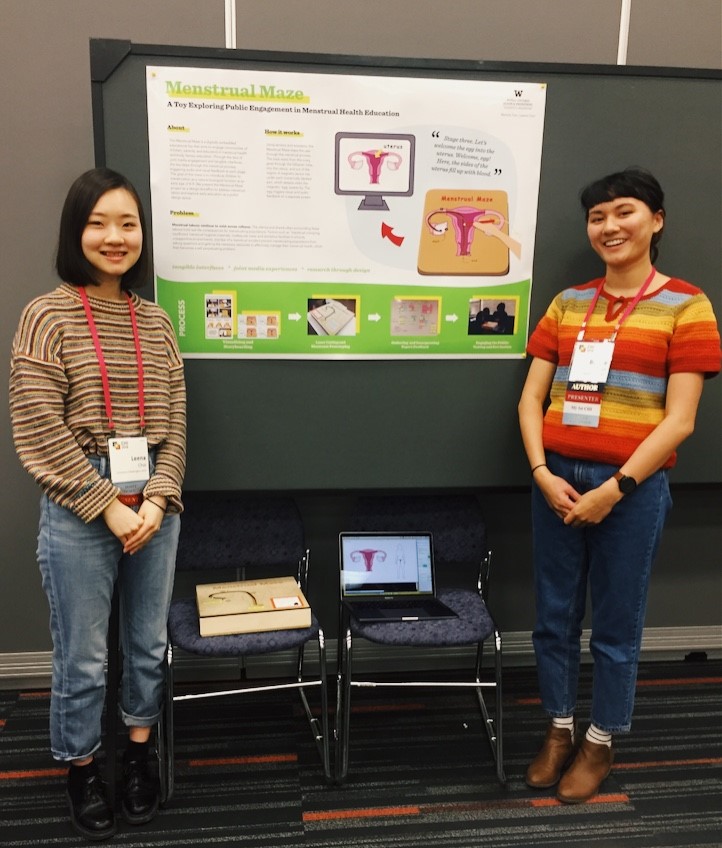 Leena Choi and Bonnie Tran at CHI 2018
Leena Choi and Bonnie Tran at CHI 2018
In April 2018, we, Bonnie Tran (HCDE senior 18’) and Leena Choi (HCDE senior 18’) attended 2018 annual ACM CHI Conference on Human Factors in Computing Systems, which was held in Montreal, Canada. Our project, Menstrual Maze: A Toy Exploring Public Engagement in Menstrual Health Education, was accepted into the Student Design Competition–and so, we were presented the opportunity to showcase our work at the conference.
Although our project did not advance past the second round, we are grateful for being able to participate in this experience as undergraduate students! We encourage others to stay on the lookout for next year’s student competition. Driving our own design research project was an ambiguous deal, but we learned a lot from reaching out to peers and colleagues for support and guidance.
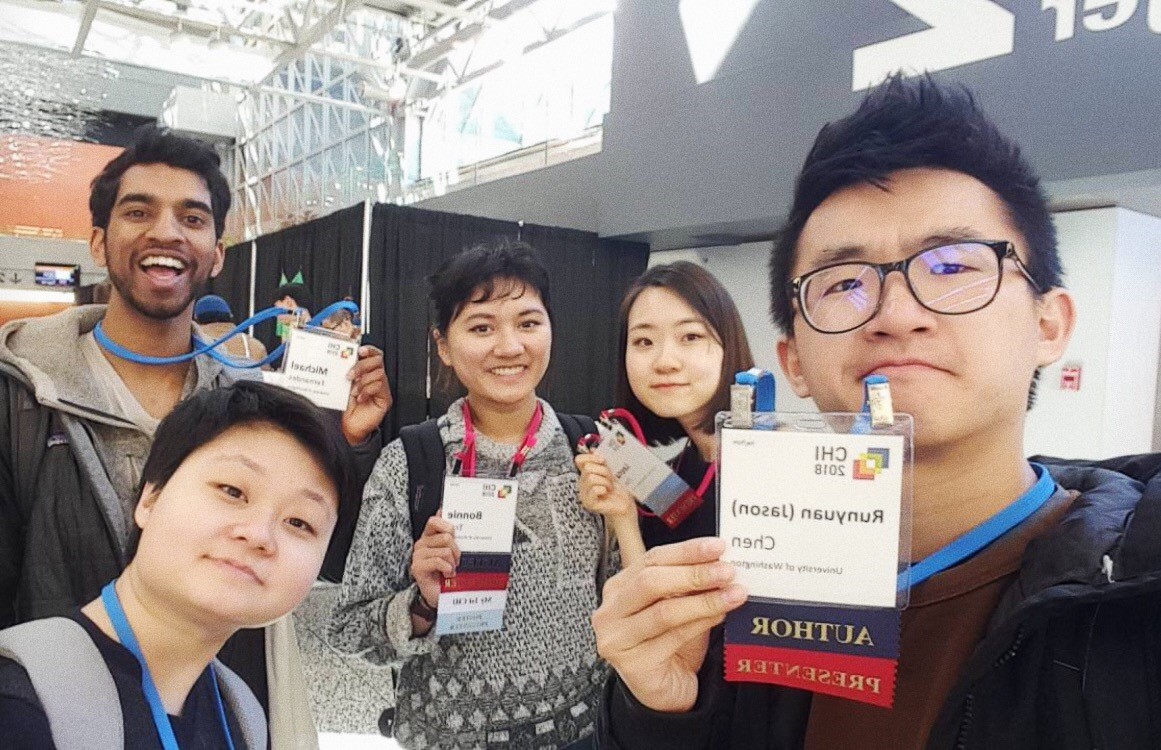 HCDE undergraduates Shin Young (Lucia) Choi, Michael Fernandes, Bonnie Tran, Leena Choi, and Jason (Runyan) Chen at the 2018 CHI conference.
HCDE undergraduates Shin Young (Lucia) Choi, Michael Fernandes, Bonnie Tran, Leena Choi, and Jason (Runyan) Chen at the 2018 CHI conference.
We would like to thank the HCDE department for supporting us to attend CHI. We would also like to thank PhD student Sarah Fox and Professor Daniela Rosner for the mentorship and encouragement throughout the process as well.
What did you think about the conference overall?
B: HCI is big… and includes many fields of study which showed through the session variety. Although acceptance for CHI papers is competitive, I noticed that doesn’t guarantee that all talks will resonate with me. As it is impossible to go to everything, I found myself being selective of what topics I wanted to learn about. Must be a filter not a sponge… or maybe a bit of both?
L: CHI is overwhelming by inspiration, smartness and good food. At the conference, there were presentations on various topics consecutively and I kept absorbing new information, which was overwhelming but at the same time, it was exciting to learn how much issues or topics we can apply our learnings to.
What talk resonated with you the most?
B: I sat in on the paper, Slacktivism or Activism?: Identity Work in the Virtual Disability March, which I’ll link right here. On a high level, this paper is about the use of digital tools for civic engagement purposes and how it impacts identity– in particular among activists with disabilities during the 2017 Women’s March. One takeaway is that traditional forms of civic participation, such as marches and rallies, are privileged and have room for more inclusion. During Q&A, a person sitting in the back on a wheelchair brought attention to the fact that the very structure of that Q&A, where people have to go up to the front where the mics were standing, was not accessible. This was yet another reminder that there is always always room to be more inclusive.
L: I stumbled upon this talk about designing for more-than-human world. This talk really resonated with me because the presenter mentioned how we often aim to solve problems for human, but not really for non-humans. It really stuck with me because it reminded me how what we design aren’t only making people’s lives easier, but also impacting our natural system.
 Treats from a bakery in Montreal
Treats from a bakery in Montreal
What was the best food you had in Montreal?
B: There is a bakery in the International District, which is a five minute walk from the conference center. I stopped by more than 5 times throughout the week. Their buns are bomb. Also, a nice caterer from the conference suggested that I should top off my poutine with smoked meat. I did that. Yum!
L: I think this picture explains everything.
What is one takeaway from the experience?
B: Bring cough medicine.
L: Be prepared for many sleepless nights because there are a lot of things going on during CHI :)
Kristin Dew, HCDE PhD student
While I've attended CHI for poster sessions and workshops before, this year was my first time with a full paper presentation. I was pleasantly surprised to receive an honorable mention for my paper with Daniela, titled "Lessons from the Woodshop: Cultivating Design with Living Materials". The presentation went smoothly and the questions I received - about design implications and how to present ethnographic work to skeptics in the community - were generous and constructive for my thinking going forward. The paper session was pivotal for meeting other researchers working in my little corner of design and for reconnecting with familiar faces.
The Special Interest Groups I attended - on Feminist HCI and Sustainable HCI - were opportunities to break out into smaller groups and link up with more folks with shared interests outside my paper session. I've run into a few of them since at the ACM LIMITS workshop, so it was a great chance to develop those relationships a bit more and get a better sense of the communities where my work fits in.
It was also heartening to see so many fellow HCDE and dub students and faculty out cheering each other on. Many thanks to the department, Graduate School, and Professor Daniela Rosner for once again supporting me as I move my dissertation work forward and begin presenting it publicly!
Sam Kolovson, HCDE PhD student
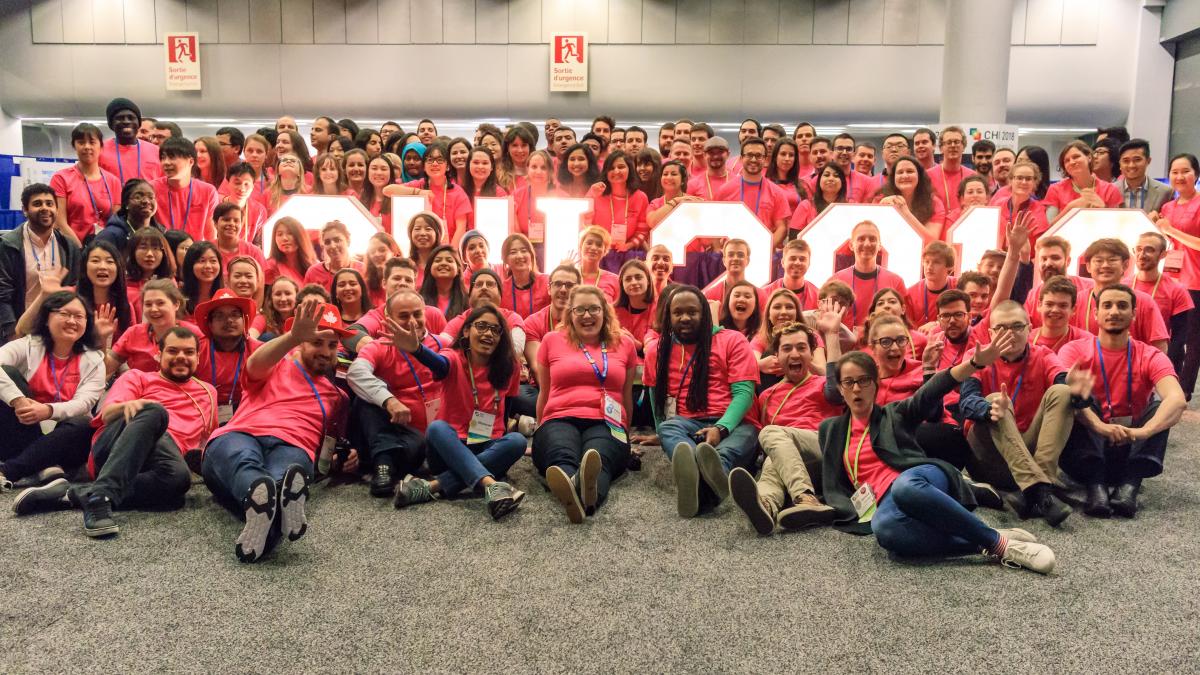
I learned a lot, networked, and had a great time at CHI 2018 in Montreal.
I traveled to the conference and stayed with a few friends in the department. For the second year, I was an Student Volunteer at the conference which proved, yet again, to be a great way to experience the conference. Many of the other students I met will be my peers for the next few years and perhaps longer depending on our respective career paths.
Being a Student Volunteer is also helpful for networking as I got to meet a lot of people from many different schools, some of which could be possible collaborators for a workshop in the future. When I was not doing volunteer duties, I got to attend a number of talks, many of which helped me reflect on my own research and I added to my long reading list.
Kai Lukoff, HCDE PhD student
 The golden hour view of Montreal from Mont-Royal. I jogged up on the evening before the conference knowing that I wouldn't have time for sightseeing during the busy conference itself!
The golden hour view of Montreal from Mont-Royal. I jogged up on the evening before the conference knowing that I wouldn't have time for sightseeing during the busy conference itself!
I attended the CHI 2018 Conference in Montreal with the theme “engage.” Technologists often use engagement levels to assess the success of a product. However, in my own work, I’m also interested in metrics that go beyond engagement and measure other constructs, such as the meaningfulness of interactions with technology. At CHI, I connected with others who share this focus: the alt.CHI track had a presentation on how to assess what users really want and a panel discussed the origins and limitations of the use of engagement metrics.
Support from the HCDE department allowed me to attend the conference as well as one workshop and one course. The workshop I attended assembled leading experts in the field of computing in mental health. It included a presentation from Steve Whittaker of UC Santa Cruz on a mobile app that tracks correlations between people’s emotions and their daily experiences and then uses that data to make recommendations as to what activities a user can undertake to improve their emotional state. The course I attended was on designing for voice user interfaces, taught by two instructors who have decades of experience in the field. It helped prepare me for a summer internship during which I will be working on a trusted voice assistant with the Mozilla Corporation.
Jasper O'Leary, HCDE PhD student
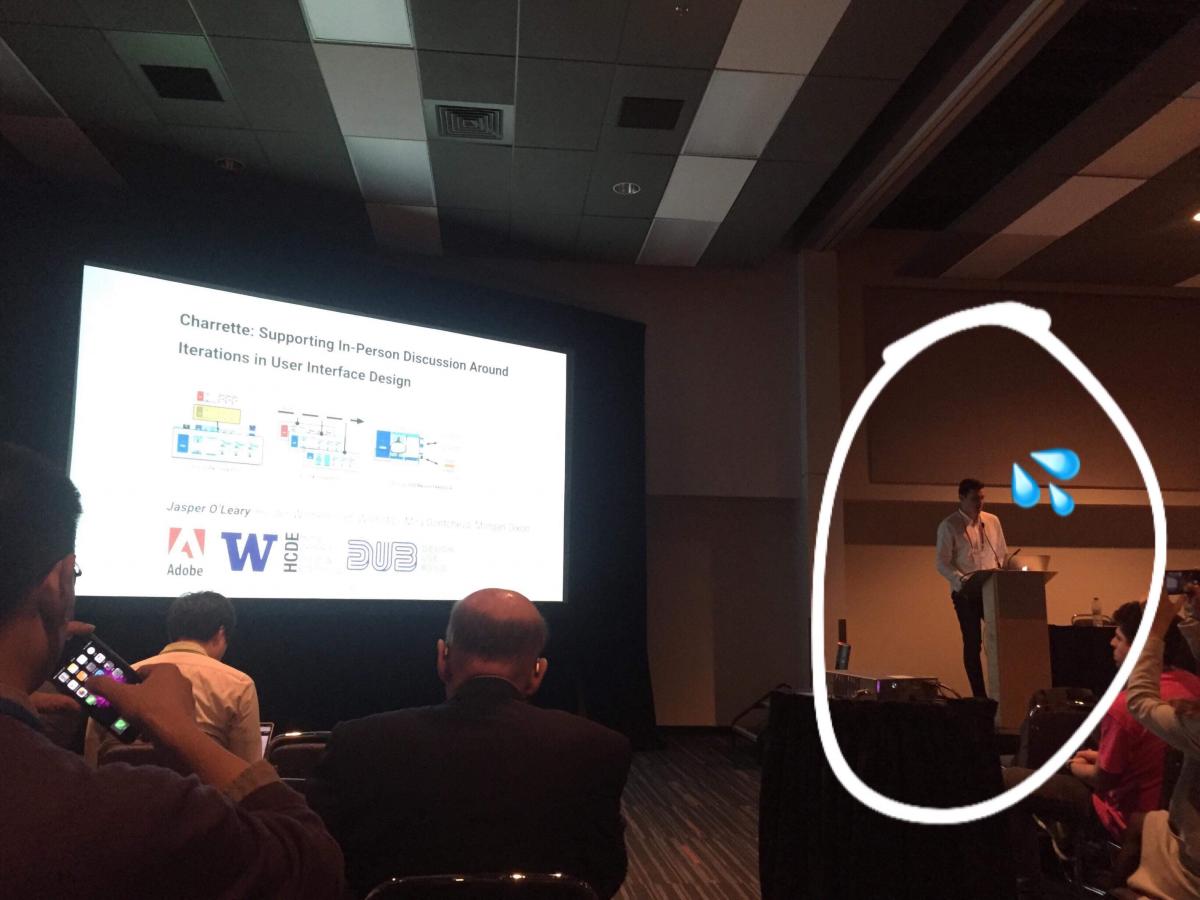
CHI 2018 in Montréal was a blast. It was my second CHI overall, so I knew the ropes a bit more this time, and was able to familiarize fellow students who were going to CHI for the first time. This CHI was also my first CHI in grad school, and it was great being a part of HCDE and UW, which was arguably the largest presence from an academic institution.
At this CHI, I presented my first talk, which consisted of my work from Adobe Research that I worked on right before joining HCDE. While working on this project, I received so much support from my mentors who are also my co-authors, and I wouldn't have made it without them. You can find the paper at this address: (https://dl.acm.org/citation.cfm?id=3174109). At the same time, while this research was done at Adobe, I think it represents what HCDE does really well, which is close, careful observation of how people are using a technology—observation which is often grounded in theory (although not in my case this time)—coupled with a targeted, technical intervention.
Thank you to HCDE to helping get me to Montréal to speak and be a part of this wonderful research community!
Sarah Inman, HCDE PhD student
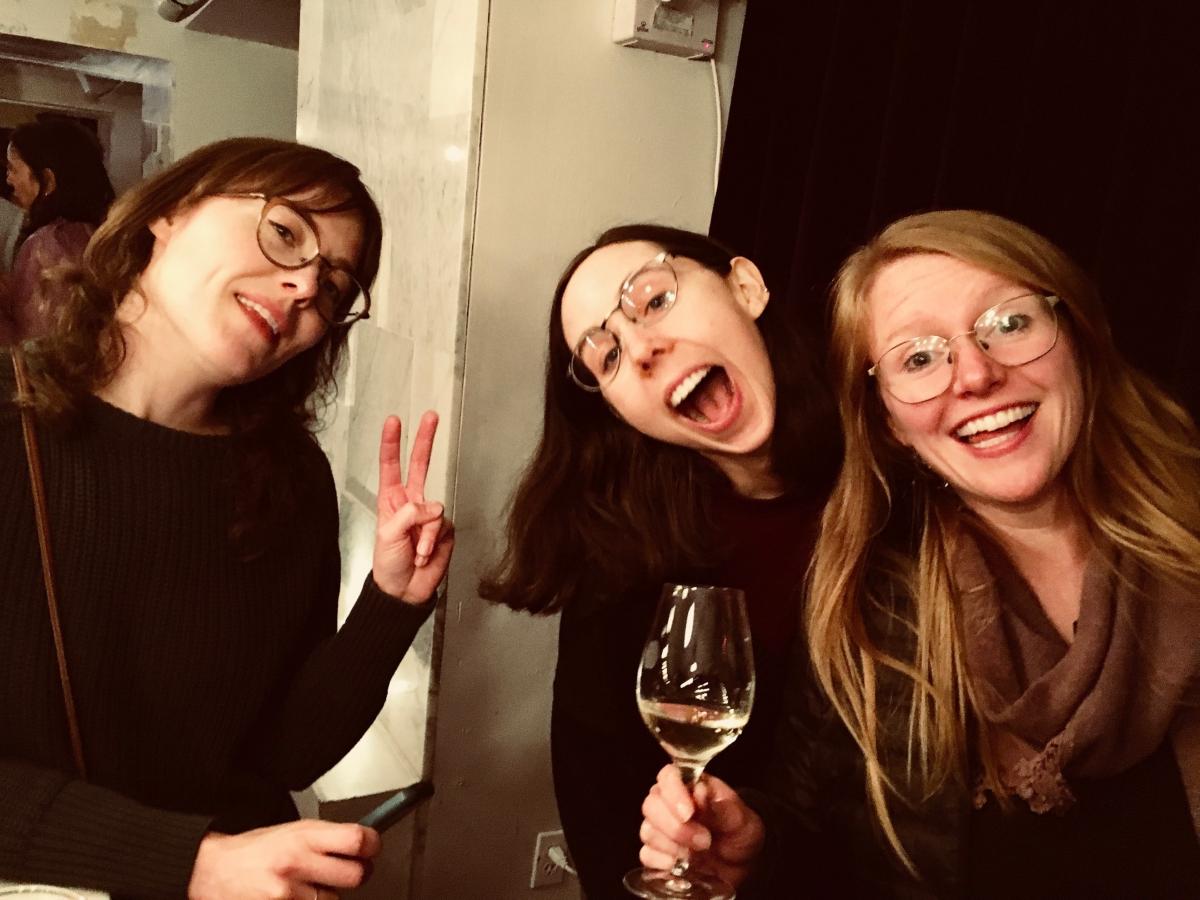 Sarah Fox, Kiley Sobel, Sarah Inman at CHI 2018
Sarah Fox, Kiley Sobel, Sarah Inman at CHI 2018
Thanks to the support from the Department of HCDE, I had the opportunity to attend the CHI conference in Montreal. This was my first time attending CHI so I was excited to explore potential areas of interest. Participating in the workshop, Untold Stories: Working with Third Sector Organizations, was a full-day experience talking with others about their design methods for engaging non-profit organizations. For this workshop, I submitted a position paper (Revealing spaces for community engagement), and was able to further my research in how data mediates relationships with natural resources for various communities of practice.
In addition to attending paper presentations and engaging with my colleagues (pictured below), I randomly bumped into a colleague from my work on arctic knowledge systems. This fortuitous meeting resulted in furthering our collaboration on polar data and community-based monitoring as he invited me to attend the Polar Data Summit in Boulder, Colorado.